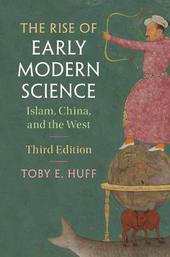
|
The Rise of Early Modern Science: Islam, China, and the West
Hardback
Main Details
| Title |
The Rise of Early Modern Science: Islam, China, and the West
|
| Authors and Contributors |
By (author) Toby E. Huff
|
| Physical Properties |
| Format:Hardback | | Pages:396 | | Dimensions(mm): Height 234,Width 158 |
|
| Category/Genre | World history
History of science |
|---|
| ISBN/Barcode |
9781107130210
|
| Classifications | Dewey:509 |
|---|
| Audience | | Professional & Vocational | | Tertiary Education (US: College) | |
|---|
| Edition |
3rd Revised edition
|
| Illustrations |
16 Halftones, black and white; 8 Line drawings, black and white
|
|
Publishing Details |
| Publisher |
Cambridge University Press
|
| Imprint |
Cambridge University Press
|
| Publication Date |
15 June 2017 |
| Publication Country |
United Kingdom
|
Description
Now in its third edition, The Rise of Early Modern Science argues that to understand why modern science arose in the West it is essential to study not only the technical aspects of scientific thought but also the religious, legal and institutional arrangements that either opened the doors for enquiry, or restricted scientific investigations. Toby E. Huff explores how the newly invented universities of the twelfth and thirteenth centuries, and the European legal revolution, created a neutral space that gave birth to the scientific revolution. Including expanded comparative analysis of the European, Islamic and Chinese legal systems, Huff now responds to the debates of the last decade to explain why the Western world was set apart from other civilisations.
Author Biography
Toby E. Huff is a research associate in the Department of Astronomy, Harvard University, Massachusetts, and Chancellor Professor in Policy Studies at the University of Massachusetts, Dartmouth. He has lectured in Europe, Asia and the Middle East and has lived in Malaysia. Huff is the author of Intellectual Curiosity and the Scientific Revolution: A Global Perspective (Cambridge, 2011) and coeditor of Max Weber and Islam (with Wolfgang Schluchter, 1999).
Reviews'A remarkable and eminently readable blend of rich historical details and analysis of the rise of modern science. An exemplar of how comparative historical sociology of science ought to be done.' Zaheer Baber, author of The Science of Empire: Scientific Knowledge, Civilization and Colonial Rule in India 'Why did the scientific revolution take place in Europe and not in China or in the Islamic world? Toby E. Huff gives this controversial question an extraordinarily wide-ranging and deep examination. Surprisingly, the answer may lie largely in the nature of Western educational institutions and in the structure of Western law.' Owen gingerich, Professor Emeritus of Astronomy and History of Science, Harvard Smithsonian Center of Astrophysics
|